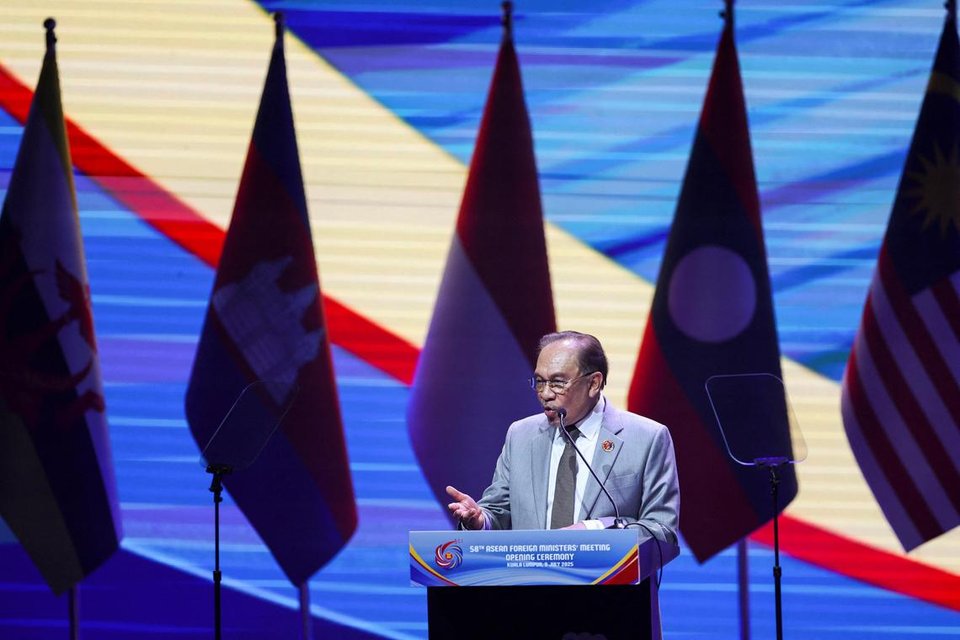Kuala Lumpur – Malaysian Prime Minister Anwar Ibrahim has called on Southeast Asian nations to intensify economic cooperation and act with “purpose and resolve” in the face of growing geopolitical friction, as US-imposed tariffs threaten to disrupt trade dynamics in the region.
Speaking at the Asean foreign ministers’ summit on July 9, Mr Anwar warned that tariffs, investment barriers, and export restrictions had become “sharpened instruments of geopolitical rivalry,” urging the 10-member Association of Southeast Asian Nations to respond not with retaliation but with strengthened regional integration.
“As global conditions remain uncertain, there is no overstressing the need to act with purpose in our own region,” Mr Anwar told ministers. “Trade more among ourselves, invest more in one another, and advance integration across sectors with resolve.”
The remarks come just two days after US President Donald Trump announced a new wave of tariffs ranging from 25 to 40 per cent on six Southeast Asian countries. Vietnam, the only country so far to negotiate a lower rate of 20 per cent, has sidestepped the steepest penalties. Other Asean members such as Indonesia, Thailand, and Malaysia have vowed to push for further talks before the August 1 implementation deadline.
The tariffs are seen as part of Washington’s broader efforts to reshape global supply chains away from China. However, the unilateral measures have rattled US allies and risk deepening economic fragmentation across the region.
According to a draft communique seen by Reuters, Asean ministers will express “concern over rising global trade tensions” and criticize unilateral tariffs as “counterproductive.” The bloc has reiterated it will not pursue retaliatory action and that any bilateral deals with Washington would not undercut Asean solidarity.
Meanwhile, Asean’s internal cohesion faces additional tests. A border dispute between Thailand and Cambodia has escalated, prompting troop deployments and the suspension of Thai Prime Minister Paetongtarn Shinawatra over a leaked call with former Cambodian leader Hun Sen. The conversation, which opponents claim compromised Thai sovereignty, has triggered a constitutional crisis in Bangkok.
Compounding tensions, Myanmar’s civil conflict continues to spiral. Malaysia’s Foreign Minister Mohamad Hasan on July 9 urged warring groups to create an “environment conducive for elections.” However, critics warn any vote under military control—absent opposition participation—would merely cement junta rule.
Amid these headwinds, Kuala Lumpur is hosting a dense series of regional meetings this week, including dialogues with major external partners such as the United States, China, Russia, Japan, India, and the European Union. US Secretary of State Marco Rubio, on his first Asia tour, is expected to face intense scrutiny from regional counterparts seeking clarity on Washington’s trade agenda.
Analysts say the region must now balance assertiveness with pragmatism. OCBC’s Lavanya Ventakeswaran noted that uncertainty around transshipment-based tariffs, especially for Vietnam, could have “far-reaching implications,” including stricter enforcement and complex compliance demands.
“It’s going to be quite complicated moving forward,” she added, noting Trump’s additional threats of 10 per cent tariffs on BRICS-aligned countries—among them Indonesia and Malaysia.
As Asean continues to champion a nuclear weapons-free zone and draft a long-delayed code of conduct for the South China Sea, the urgent message from Kuala Lumpur is clear: in a world leaning toward division, the region must choose unity, or risk irrelevance.






